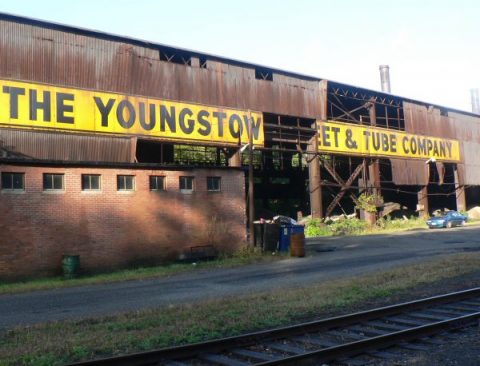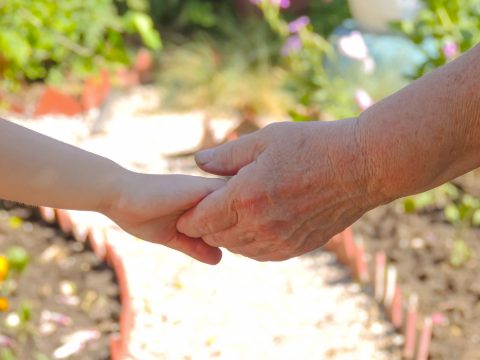Blasphemy!
. . . I sat in a salon chair listening to my stylist talk about his daughter’s recent marriage. I asked if he expected grandchildren. His reply?
“Given the way the world is now, I wouldn’t be at all upset if they decide not to bring any children into it . . . in fact, I’d prefer it that way.”
This was blasphemy, the likes of which I had never heard. Most people I knew considered their lives incomplete until they had grand-babies. Over sixty and not a member of the grandparents’ club? You are so pitiful. Over sixty and think it’s OK not to have grandchildren? You are not only pathetic, you are incredibly dense in not realizing what you are missing.
At the time, I was not yet old enough to be pitiful.
Still plenty of babies
You may know that the US birthrate is in decline. Women are deciding to delay childbirth or not to have children at all. Who can blame them? The United States of America is one of the most difficult countries in which to have children and raise them to be responsible, contributing adults. There is no paid parental leave policy. Child care is expensive, and not subsidized. Despite increased father participation in housework and childcare, women still carry the bulk of the burden of work of raising children.
Consider the cost. Investopedia currently estimates that it will cost $310,605 to raise a child born in 2015 to be 17 years old. That doesn’t count higher education costs. To couples already burdened with high levels of student loan debt and the disintegration of unions, livable wages and lack of a structured safety net, this almost a third of a million dollar number is overwhelming.
In addition to the economic factors and lack of social support, potential parents face bringing up children while dealing with rapidly escalating climate change, pollution, crumbling infrastructures and failing educational systems. Less tangible, but no less real are glaring inequities among peoples, injustices of society and always, always war somewhere on this earth.
Yet, despite all this, there are still many new babies born in the United States. According to US Census data, even 2020, which had the lowest birthrate of any year so far, the average daily birthrate was 9,850. Multiplying 9,850 by 366 (2020 was a leap year) gets us a total of 3,605,100 new people in the United States in 2020 and the rate has been increasing ever since.
That’s averages to 410 babies every hour, almost 7 babies a minute. Still a lot of new parents, grandparents and great-grandparents every day of the year.
Worrying about grandchildren wasn’t always a thing
I am certain that my grandparents didn’t worry about my success. The only path available for me was raise a family, just like my mother had done. All I had to do was find a job to be able to pay my parents room and board until I found some guy with a decent job who was willing to take on the responsibility. Higher education was not an option. I had learned how to type and take shorthand, and I was good at it. I went to work at a local law firm the Monday after I graduated high school. To be a legal secretary, I made around the Pennsylvania minimum wage–at that time about $1.60 per hour.
My fellow high school graduates had opportunity also. Nearby manufacturing in Youngstown, Greenville, Sharon and Mercer — steel mills, railroad car manufacturers, and all the supporting industries provided those not destined for college a place to earn a nice living.

We had no idea
Totally unaware of what was ahead, we didn’t know that those great opportunities in manufacturing had already started to disintegrate.
US manufacturing peaked in the early fifties and has declined ever since. Mercer County, Pennsylvania, where I grew up, lost between 43% and 56% of its manufacturing jobs between 1954 and 2002. Butler County, Pennsylvania, where I now live, lost over 58% of its manufacturing jobs in the same time period as did most of the counties in southwestern Pennsylvania, including Allegheny County.
Once thriving communities became ghost towns. Main Street stores closed their doors. Young people moved to find opportunity for a better life.
Finally, as a young adult, I had the opportunity to pursue a college education. I was able to take advantage of community college, student loans and tuition reimbursement from an employer. My student loan debt was around $5300 which I paid back over ten years.
Opportunity evaporated
By the time my daughter graduated high school, the opportunities for career-related work with a high school education had evaporated. Technology had done away with the jobs requiring skills like typing and shorthand, mechanical drawing and switchboard operation. Our culture had shifted to emphasize college education as the key to success. Jobs in the trades and service industry were relegated to a lower status. The minimum wage had stagnated and full-time opportunity was limited. People cobbled together two or three part time jobs to make ends meet.
At the same time, the cost of college education skyrocketed. A year’s tuition, fees, room and board, and adjusted for inflation cost $10,231 in 1980. That same year of college by the 2019-2020 year cost $28,775; a 180% increase. During those same years, state and federal governments decreased funding for colleges.
Given the exorbitant cost, higher education was out of reach for many young people. Many decided to take out loans and ended up with steep debt by the time they graduated. Employer-funded tuition reimbursement programs are rarely available in these times where corporate focus is on the bottom line.
Wouldn’t it be nice?
It would be such a relief if we could ignore what’s going on in politics. Turn away from thoughts of climate change and the gross inequities of today’s society. Ignore problems of those who go to bed hungry. That’s hard when even the local grocery store parking lot frequently has a young woman asking for money for herself and her children because she’s just lost her job.
Some people are able to turn away. “That’s their problem” is a not-uncommon response from those questioned about government’s affect on their own grandchildren and great-grandchildren.
If you’re a grandparent today, you cannot be certain your grandchildren will be able to survive the future of this planet and country, let alone thrive. In the short 38 years between my high school graduation and that of my daughter, the world changed drastically. Technology and climate, socio-economic and political changes wreak havoc on the daily lives of many.

We can deny there are any problems. We can turn our heads and cover our ears and eyes. We can try to hide. We cannot; however, escape the fact that we have played a part in creating the world we are handing off to those who come after us.
Your grandchildren did not ask to be born. No child asks to be born and they are not given a checklist in utero about who they’d like for parents or what kind of house they will live in.
Children can only trust those who brought them into the world to do right by them. To provide the environment a child needs. They can only trust that you and I will do our best to leave them a world in which they have a chance to thrive.
The other day I was watching a little girl walking down the street, playing a game. Her dad had one hand, her grandmother had the other. She began the count. One. Two. Three. As she hit three, it was her dad’s and grandmother’s job to pick her up by the hands and “fly” her forward a few steps as she giggled in glee. After landing, she started the count again. On they went until they hit a cross street.
This child trusted her father and grandmother. She knew they would hold on to her hands and not let go as she “flew.” Just like she knows that when she is hungry, she will be fed; when she is tired she has a warm and safe room in which to sleep.
Even as this child is one of the lucky ones, there is no way of knowing if her good fortune will continue.
Today’s grandparents have a bigger role
Among my friends and family are grandparents who have had outsized roles in raising grandchildren and great grandchildren. One provides a haven for a great-grandson born to a grandson who struggles with drug issues and a woman who has difficulty forming adult relationships. Another tried to educate a granddaughter with an absent mother, hoping she would grow into adulthood before having children of her own. That granddaughter now has a child of her own. A grandmother takes her grandchildren on trips to expose them to worlds they would not otherwise experience. A grandfather has spent a great deal of money on rehab for a grandson with alcohol addiction problems.
Many of today’s grandparents have taken on this larger role. They are doing whatever they can in the hopes their grandchildren and great-grandchildren will thrive in this world, be able to grow to a mentally and physically healthy adulthood and lead productive lives.
What about your grandchildren? The grandchildren of your friends and family? The grandchildren and children down the street? Are they thriving? Just getting by? Struggling?
Can you do something about it?


0 Comments